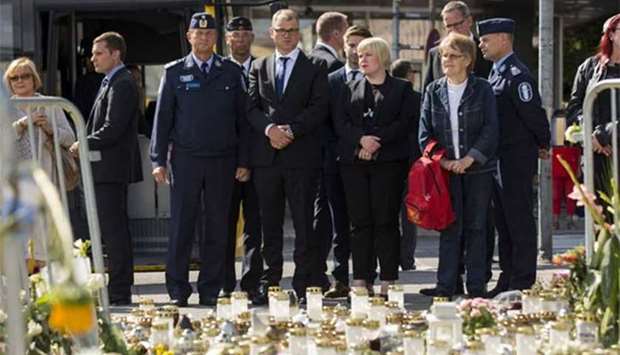Court documents on Monday identified the suspect in last week's stabbing spree in a Finnish city as 18-year-old Abderrahman Mechkah, with the country's intelligence agency saying he may have been radicalised.
The stabbing is being probed as the country's first-ever terror attack.Police had previously described the suspect as an asylum seeker from Morocco, though the court documents did not mention his nationality.
He targeted women in the attack at a market square in the southwestern port city of Turku on Friday. Two people were killed and eight were injured.
The motive for the attack is unclear. But the Finnish intelligence agency SUPO said Turku police had received a tip early this year that Mechkah "appeared... to have been radicalised and showed interest in extremist ideologies."
Questioned by AFP, SUPO spokeswoman Verna Leinonen said the agency "could not comment on" whether the alleged radicalisation concerned extremism, nor how he may have been radicalised.
The tip, which had been forwarded to the SUPO, "contained no information about any threat of an attack."
Mechkah, whom police shot in the thigh while arresting him minutes after the rampage, is to appear before the Turku court on Tuesday via video link from hospital, the National Bureau of Investigation (NBI) said.
His court appearance had initially been scheduled for Monday.
Police will ask the court to remand him in custody on suspicion of two murders and eight attempted murders "with terrorist intent".
Investigators said on Sunday that they had interrogated the suspect for the first time, but disclosed no information about the outcome.
Police will also request the detention of four Moroccan citizens who were arrested in an overnight raid on a Turku apartment building and refugee housing centre just hours after the attack.
"They are suspected of participation in the murders and attempted murders committed with a terrorist intent. They deny any involvement in the offences," the NBI said.
Meanwhile, the German interior ministry said on Monday that Mechkah had spent time in Germany from late 2015 to early 2016.
He never applied for asylum but was registered in a German police database over his illegal stay.
"He was in Germany in late 2015, early 2016," said interior ministry spokeswoman Annegret Korff. "He didn't apply for asylum."
German authorities were in close contact with their Finnish counterparts over the case, the ministry said.
Police said earlier that the suspect was an asylum seeker who arrived in Finland in early 2016.
Friday's attack occurred just after 4:00 pm, with police shooting the knife-wielding suspect minutes later.
The two people who died were both Finnish women, born in 1951 and 1986. Six of the injured were also women, while two men were injured trying to fend off the attacker.
Among the injured were an Italian, a Swede and a Briton.
Finland raised its emergency readiness level after the attack, increasing security at airports and train stations and putting more officers on the streets.
On Monday, national police commissioner Seppo Kolehmainen tweeted that the situation had returned to normal.
The SUPO said authorities had received over a thousand tips in recent years similar to the one concerning Mechkah.
"Our aim is to investigate all tips, but in order to go through all of them we have to prioritise heavily. Those tips that contain information about a concrete threat must be prioritised," it said.
In June, the SUPO raised Finland's terror threat level by a notch, to "elevated" from "low", the second on a four-tier scale.
It said at the time that it saw an increased risk of an attack committed by Islamic State militants, noting that foreign fighters from Finland had "gained significant positions within IS in particular and have an extensive network of relations in the organisation."
The agency reiterated on Monday that it was closely watching around 350 individuals -- an increase of 80% since 2012.
Between 2015 and the end of 2017, a total of 247 Moroccan citizens applied for asylum in Finland, the Finnish Immigration Service said on Monday.
And from 2015 to the end of July 2017, 294 Moroccan asylum seekers received decisions on their cases, of whom 32 received a positive decision of either asylum or a residence permit.

